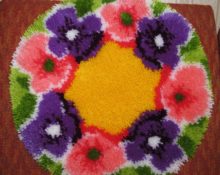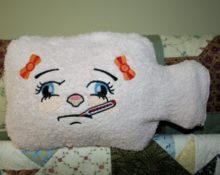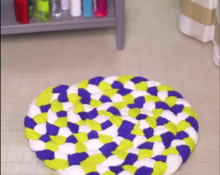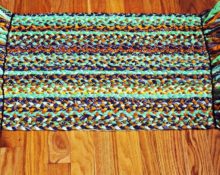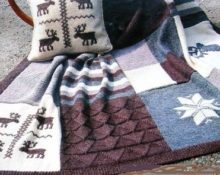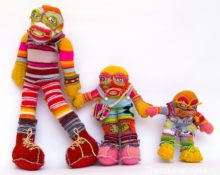A T-shirt is comfortable and practical clothing. Inexpensive items made from natural fabrics have one drawback: one day there are too many of them in every wardrobe. You should not put on rags those products that have not been used for a long time. If you get creative with old T-shirts, you can easily make homespun rugs.
Preliminary stage
For the remodel to be successful, you need to take care of everything necessary in advance and choose the appropriate method of work.
Preparation of tools and materials
During the activity you will need the following tools and materials:
- old T-shirts;
- sharp scissors;
- a needle and threads of suitable density and color;
- Hook No. 15 – 20 (if you decide to knit a rug).
The specific list of basic materials depends on the chosen method of work.
Reference! When making a mat on a base or on a frame, in addition to the basic materials, you will need cardboard, glue, a frame and small nails or a gymnastic hoop.
Selecting T-shirts and preparing them for alteration
From the (clean!) T-shirts accumulated in the closet, those suitable for alteration are selected.
Item selection parameters
Fabric density. It is best to use products of the same density: thin T-shirts or sweatshirts made of thicker knitwear.
Color. You need to imagine in advance how the colors of different T-shirts will be combined in a new product.
When selecting things, you can use clothes that have different shades of the same color, for example, dark blue - blue - light blue - pale blue.
Rugs made from contrasting colored items, as well as variegated, multi-colored items, look good. In this case, you can choose several (no more than 3) primary colors and complement them with color shades.
Important! T-shirts that have lost their color (faded from the sun or faded from repeated washing) can be pre-dyed by choosing paints in the desired colors.
Cutting strips for weaving
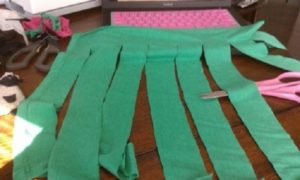 A homespun rug is made from a special “yarn” - knitted strips. They are cut from old clothes prepared for conversion.
A homespun rug is made from a special “yarn” - knitted strips. They are cut from old clothes prepared for conversion.
Strip cutting options
Without cutting the T-shirt:
- Round;
- In a spiral;
Cutting the product along one side seam:
- On separate lanes.
Reference! The width of the strips depends on the density of the fabric. Narrower strips (from 1.5 to 2.5 cm) are cut from thin knitwear. Wider stripes (up to 4–5 cm) can be made from thick knitted fabric.
To ensure that the stripes are the same width, you must first mark the cutting lines on the fabric.
After cutting the strips, you need to stretch them a little and then connect them. To do this, they can be sewn or tied together. You can use another connection method: using cuts. They are made by retreating about 1.5 cm from the edge of the strip. To fasten, one strip is placed on top of the other so that both cuts coincide.Through this double cut, the free edge of the strip that is at the bottom is pulled. So the 2 tapes are connected, after which they begin to connect the next tape.
For ease of work, the connected strips are wound into balls.
Choosing a way to do the job
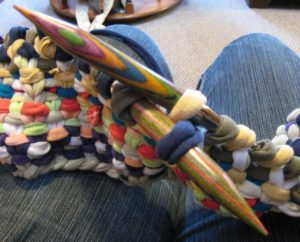 When starting needlework, you need to choose the method in which the work will be done. There are several options for making rugs from T-shirts:
When starting needlework, you need to choose the method in which the work will be done. There are several options for making rugs from T-shirts:
- Knitting;
- Weaving (ribbon, braids);
- With or without the use of a base (mesh, fabric).
Work execution technology
Knitted rug
Advice! This method of alteration is suitable primarily for those who know how to crochet.
- Prepare balls of knitted yarn.
- Crochet pattern. Cast on air loops (5), loop them using a connecting post. In the next row, the ring is tied with single crochets (8). On each loop of this row, 2 single crochets are knitted. In the next round, again make 2 single crochets from one loop, and the next - a regular single crochet. This alternation is repeated around the entire circumference. Starting from the next row, between each double columns, increase the number of regular ones: in one row - 2, in the next - 3, etc.
- Knit the required diameter and finally fasten the knitted strip.
Important! If there is no hook, knitting can be done by hand by pulling the strip through a knitted loop. Knitting without a hook has longer lead times; this will not affect the quality of the product.
Wicker product
From ordinary strips
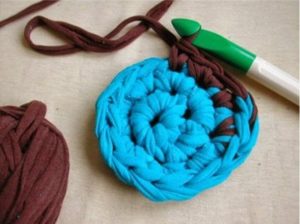 For a rug woven from strips, you will need a frame. You can use a regular baguette for the picture. Suitable frames are made from wooden slats or polypropylene tubes, which are connected with corners.
For a rug woven from strips, you will need a frame. You can use a regular baguette for the picture. Suitable frames are made from wooden slats or polypropylene tubes, which are connected with corners.
Operating procedure:
- Horizontal strips are stretched across the frame, leaving equal distance between them. The ends of the strips are tied to the frame.
- Each vertical strip is passed under the horizontal strip in turn, then pulled over it and again brought under the strip. In this way the rug is woven, filling the entire area inside the frame.
Advice! You can use a gymnastic hoop as a frame. In this case, it will be possible to make a round rug. First, ribbons are attached to the hoop along its diameter, connecting them in the center. Then the product is filled in a circle with transverse stripes, passing them above and below the longitudinal strips.
From braids
Another version of the product is made from knitted braids.
Operating procedure:
- Three strips are used to make knitted braids.
- The resulting braids are sewn by hand or with a machine seam.
Advice! Braids can also be used to make a knitted rug.
Mat based
Mesh based
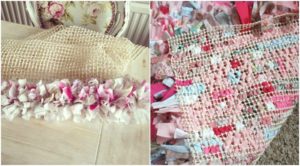 A homespun rug can be made without a frame. In this case, you will need a mesh base. Construction mesh is suitable for handicrafts (for painting or plastering work).
A homespun rug can be made without a frame. In this case, you will need a mesh base. Construction mesh is suitable for handicrafts (for painting or plastering work).
Procedure:
- The base of the required shape (square, rectangle, circle, rhombus, oval, heart) is cut out of the mesh.
- The strips are cut into small pieces (from 10 to 12 cm).
- Each part of the ribbon is passed into a cell and tied. The remaining pieces of fabric above the knot will become the “pile” of the carpet.
- After filling all the cells of the grid, you get an original rug.
Fabric based
Procedure:
- The base is cut out of the fabric, giving it the shape chosen for the product.
- The T-shirt is cut into wide pieces (the width of the stripes is 15 cm).
- Each ribbon is folded in half (new width - 7.5 cm). The edges of the ribbons are connected with a running stitch. It is performed at a distance of about 1.5 cm from the edge.
- Fringes are made on double stripes. To do this, the folded edge is cut, the length of the cuts is 4 - 4.5 cm. There should be about 1.5 cm left from the seam to the edge of the cut.
- Fill the base with fringed stripes. The work is carried out in the direction from the edge to the center. The strips are placed on top of each other so that only the upper part of the fringe remains open. The strips are first basted to the base and then machine stitched.
How to care for rugs made from old T-shirts
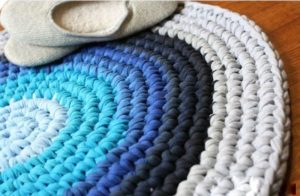 A homespun rug will help make any room in an apartment or country house cozy. Caring for a homemade product is easy.
A homespun rug will help make any room in an apartment or country house cozy. Caring for a homemade product is easy.
Rules for caring for homemade rugs:
- Products should be washed regularly in warm water, without using aggressive detergents. Washing can be done either by hand or by machine. The appropriate machine wash cycle is delicate.
- It is best to dry the rugs by carefully laying them out on a flat, horizontal surface.


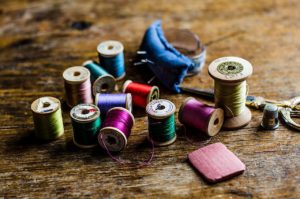
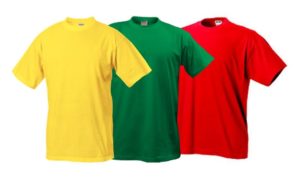
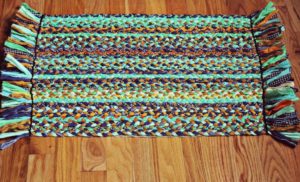
 0
0